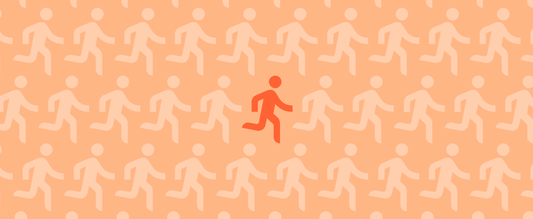Mix up your movement! How varying exercise boosts focus, mood, and wellbeing
Read Time 4.5 mins
Why exercise matters for ADHD
The power of variety in exercise
ADHD brains tend to thrive on novelty and stimulation. Whilst a structured routine can be useful, doing the same workout over and over can quickly become boring, causing you to become demotivated. That’s why mixing things up is crucial!
The best types of exercise for ADHD
So, what kinds of movement are best? A combination of the following three types can help maximise the benefits to your busy brain:
1. Cardiovascular (moderate to high-intensity)
This includes running, cycling, dancing, swimming, hiking, rowing, aerobics, and martial arts.
• Burns off excess energy and improves dopamine regulation.
• You can do this anywhere – even if you just run on the spot!
• Easy to incorporate into day-to-day life, i.e. swap out your drive to the shops for a brisk walk
Top tip: ‘Moderate intensity’ means you can talk but not sing.
‘High intensity’ means you can’t talk or sing.
Guideline: Aim for five sessions of 30 minutes at moderate intensity, or half that time at high intensity.
2. Strength training
This includes push-ups, squats, deadlifts, kettlebell training, bench press, glute bridges, and Russian twists.
• Builds muscle mass, which supports overall wellbeing and energy regulation.
• No equipment required – you can utilise your own bodyweight to perform the exercise
Guideline: Two to three times a week for a few minutes per session.
3. Balance and coordination training
This includes yoga, tai chi, Pilates, balance board, side-leg raises, and stability ball exercises.
• This type of activity helps to improve your coordination and body awareness.
• Slower movement enhances control over the body and mind.
• Helps reduce anxiety by promoting mindfulness and deep breathing.
Additional benefits of exercise for your ADHD brain
• Reduces rumination – Frequently find yourself overthinking? Movement can help to quieten your racing mind.
• Enhances sleep quality – Regular exercise regulates sleep hormones. This can make it easier to fall and stay asleep.
• Boosts your self-esteem and motivation – Completing workouts builds confidence and provides a sense of accomplishment.
Top tips for staying motivated
With any wellness routine, consistency is key. Here’s some ways to ensure you keep showing up for yourself:
• Any movement is better than no movement! If a structured workout feels overwhelming, just go for a walk. All movement counts!
• Find an accountability partner.
Exercising with a friend, joining a class, or using a fitness app can help you stay committed.
• Choose activities you actually enjoy.
Hate running? Then don’t force it! Find exercise that excites you, whether it’s dancing, hiking, or martial arts.
• Experiment with different workouts
Enjoy a mix of cardio, strength, and balance-based exercises throughout the week to stay engaged.
• Avoid exercise right before bed. High-intensity workouts can spike your adrenaline, making it harder to fall asleep. Choose lighter movements in the evening, such as yoga or tai chi.
Conclusion
For individuals with ADHD, exercise is about so much more than just fitness - it’s your key to improving mental clarity, reducing stress, and regulating your emotions. Remember - variety is key! Keep your workouts fresh and engaging to prevent boredom and maximise the benefits. By including different types of movement, exercise can be transformative, improving your focus, mood, and overall wellbeing.
About the author
Dr Ed Rainbow is a GP and men’s mental health advocate and practitioner. If you or someone you know could benefit from his support, you can check out the services he offers here. You may also want to read Ed’s fantastic blog which offers guidance and insight on topics such as dealing with loss, mastering emotions and building resilience.

Football and Focus - the Challenges of ADHD as a Professional ...
Read Time 4.5 mins

Neurodiversity in Sport - The Power of Understanding
Read time 5 mins

Reframing Yoga for ADHD: Rosie Turner and ADHD Untangled
Read time 5 mins








